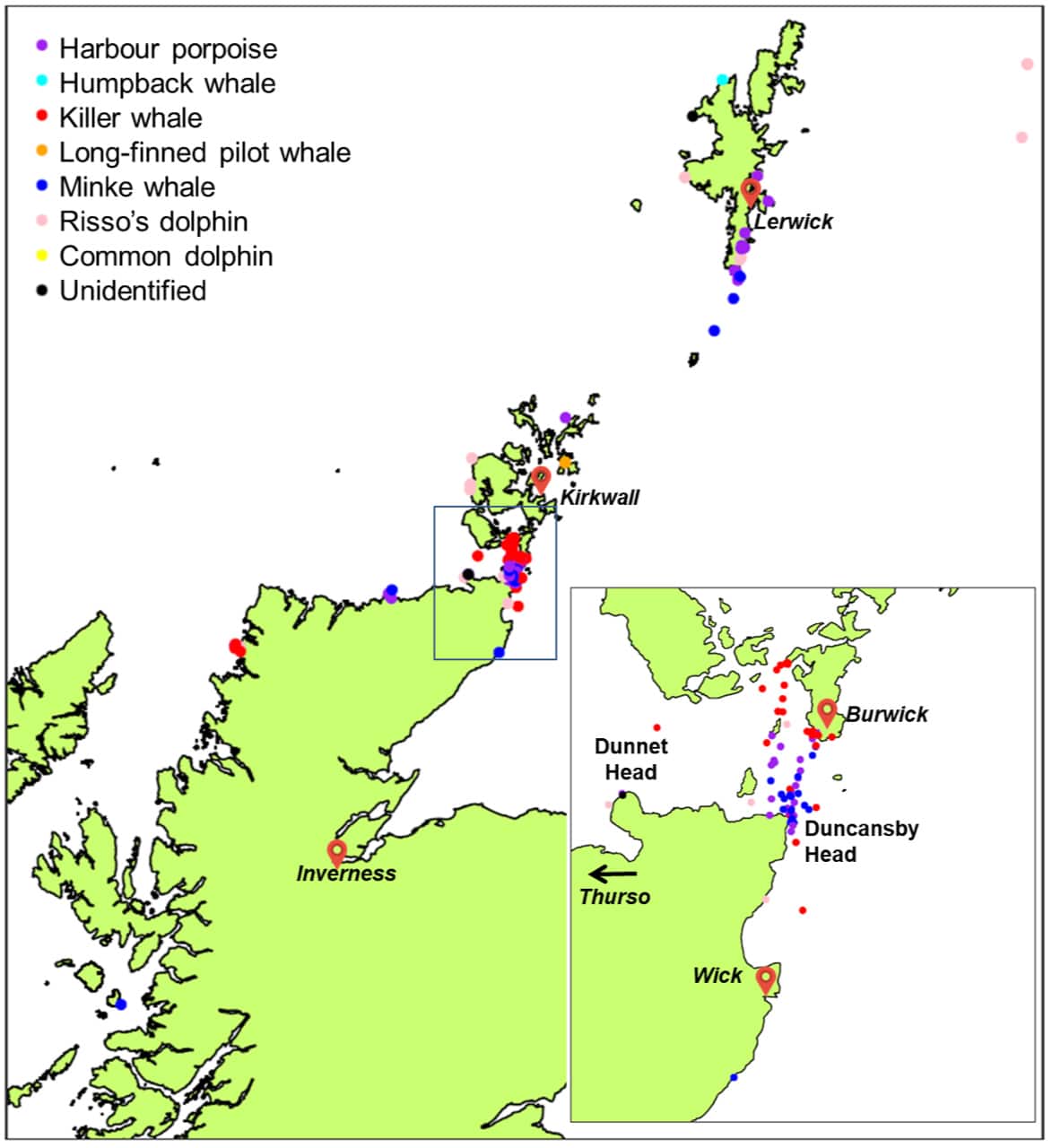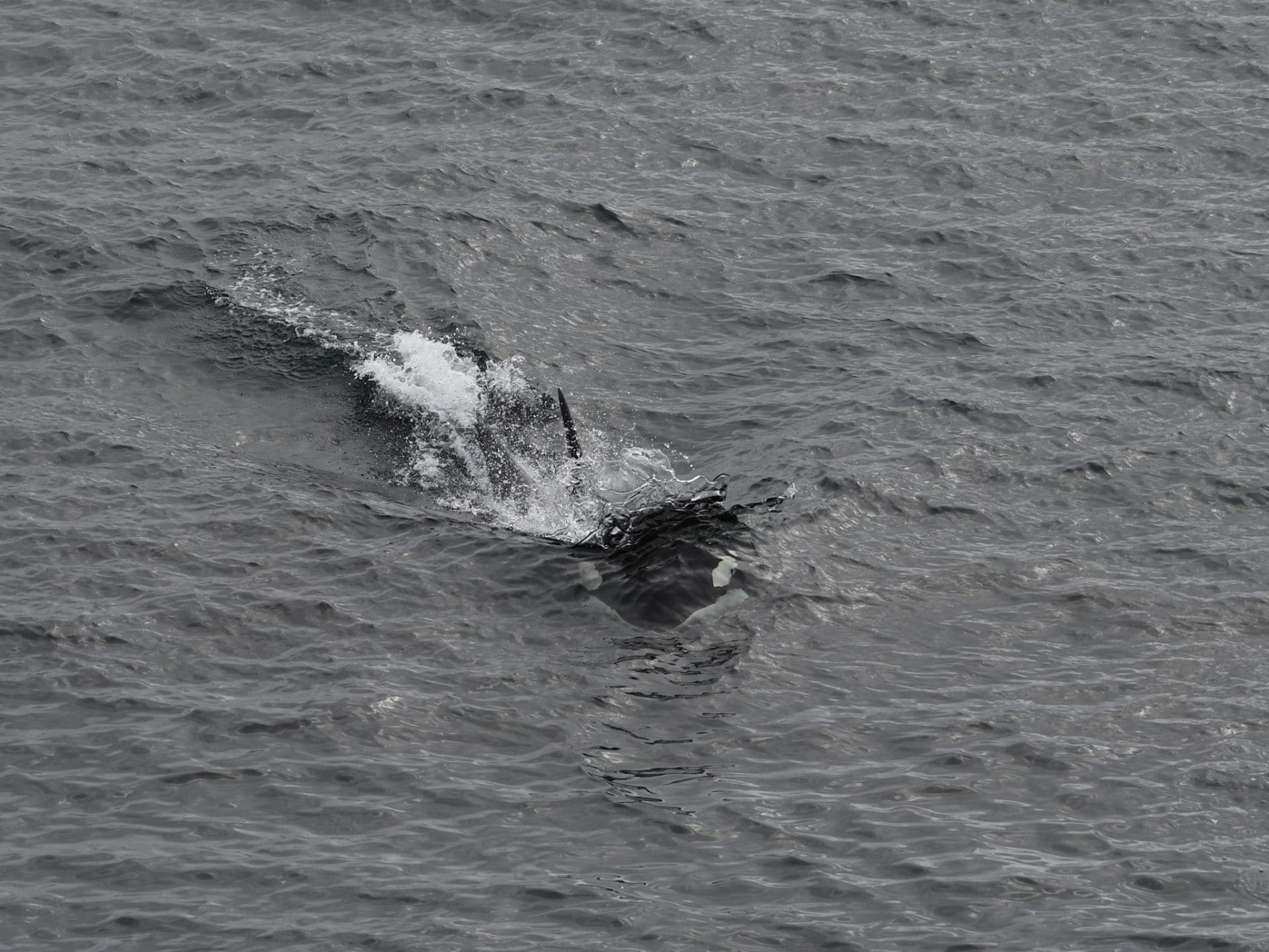Marine Life & Conservation
Unprecedented effort to protect Orcas with citizen science: the 2019 Orca Watch event results are out!

![]() For ten days in late May, tourists, wildlife enthusiasts and local businesses around Caithness, Orkney and Shetland support Orca Watch, a citizen science project organized by the Sea Watch Foundation now in its 8th year, hoping to catch a glimpse of killer whales otherwise known as orcas, and any other species of cetacean (whale, dolphin and porpoise) visiting the waters of the Pentland Firth.
For ten days in late May, tourists, wildlife enthusiasts and local businesses around Caithness, Orkney and Shetland support Orca Watch, a citizen science project organized by the Sea Watch Foundation now in its 8th year, hoping to catch a glimpse of killer whales otherwise known as orcas, and any other species of cetacean (whale, dolphin and porpoise) visiting the waters of the Pentland Firth.
They stand endlessly from cliff tops and from the John O’Groats ferry decks, collecting sightings, behaviour, geographical positions and photographs of orcas and any other cetacean species which passes by.
The idea of organizing this event started with Colin Bird, Sea Watch’s long-standing Regional Coordinator for North-East Scotland, and was influenced by concerns over the possibility of underwater turbines installed in the Pentland Firth. This initiated the first seasonal watch in 2012 to gather information on how orcas use this area and what might be the consequences of such an installation.
“Without knowing how orcas or other cetaceans use the Pentland Firth, or which role they play in the ecosystem in the area, it is impossible for scientists and conservationists to know how to develop plans to protect them” says Dr Chiara Giulia Bertulli, Sightings Officer and lead organizer of this year’s Orca Watch event.
The Sea Watch Foundation in collaboration with eight other organizations (Whale and Dolphin Conservation, Scottish Natural Heritage, John O’Groats Ferries, Pulteneytown People’s Project, RSPB Orkney, Sanday Development Trust, High Life Highland Countryside Rangers, and the Hebridean Whale and Dolphin Trust) aims to change that with a research project that enlists the help of citizen scientists from all around Scotland and its offshore Isles.
During the 2019 Orca Watch, hundreds of volunteer observers spent almost 200 hours (100 more than in 2018) collecting 122 sightings of seven different cetacean species, stationed at 30 land watch sites (main site at Duncansby Head, Caithness) and aboard one vessel (operated by the John O’Groats Ferries) around Caithness, Orkney, and Shetland. Orca sightings were also sent in from the west coast of Scotland and the Hebrides.

LOCATIONS OF CETACEAN SIGHTINGS (N=122) COLLECTED DURING THE 2019 ORCA WATCH EVENT (MAY 17-26). COPYRIGHT: SEA WATCH FOUNDATION.
Species seen includes orca, Risso’s dolphin, humpback whale, harbour porpoise, short-beaked common dolphin, minke whale, long-finned pilot whale.
“This looks like being the best Orca Watch event of the last few years”, reported Dr Chiara Giulia Bertulli.
Harbour porpoises were the most commonly sighted species during Orca Watch. This species was recorded 46 times (38% of all records).
The Orcas were the second most commonly sighted species during Orca Watch, with 27 sightings (22%). Groups varied in size from a single individual to a group of 10 with an average group size of 3. Sightings were distributed around Orkney and Caithness, with few sightings also reported from Sutherland (Handa Island) and from the Outer Hebrides (Isle of Lewis). Orcas were first spotted on May 17st from Hoxa Head (Orkney) and on May 19th they were sighted off both Handa Island and Gary Beach, Isle of Lewis. On May 20th they were sighted from three different location around Orkney (Buwick, Hoxa Head, Lidell) and then in Caithness on May 21st during the morning ferry ride onboard the Pentland Venture (John O’Groats Ferries). After two days of bad weather and no further sightings morale seemed low. However at dusk on May 24th they were finally sighted at the Stacks of Duncansby and remained in the area through May 25th and 26th. Two known orcas were also sighted on May 26th from Burwick and Duncansby and from onboard the John O’Groats ferries. They are commonly referred to as “Hulk” and “Nótt”, which are orcas that are known to travel between Iceland and Scotland on foraging trips.
Minke whales were the third most abundant species recorded during Orca Watch, with 26 sightings being made, accounting for 21% of all records.
“Never in my wildest dreams did I imagine it would be that amazing! – spending the whole day watching them swimming off Hoxa Head as the light started to fade was something I am not going to forget easily” said Christina Worth, a Sea Watch Volunteer Observer, who sighted the orcas during her land-watch off Hoxa Head.
“Other interesting sightings from this year’s Orca Watch week included a humpback whale sighted off Nista Skerries, Uyea, a lone common dolphin encountered on May 21st off Gletness, Shetland, and many close encounters with minke whales sighted off Duncansby Head”, added Chiara.
“We are very pleased with the amount of information we have gathered during this year’s Orca Watch and our immense gratitude goes to our lead volunteer organizers from all of the groups (particularly Anna Jemmett, Lucy Baldwin, Steve Truluck, Rob Lott, Karen Hall, Emma Neave-Webb, Colin Bird, and Karen Munro), to all our network of volunteer observers, regional coordinators, to our partners and to all the local businesses that have pitched in, offered generous discounts and taken great care of all our Orca Watchers”, concluded Chiara.
For more information on the work of the Sea Watch Foundation visit their website by clicking here.
Marine Life & Conservation
Leading UK-based shark conservation charity, the Shark Trust, is delighted to announce tour operator Diverse Travel as a Corporate Patron

 Corporate Patrons provide a valuable boost to the work of The Shark Trust. The Trust team works globally to safeguard the future of sharks, and their close cousins, the skates and rays, engaging with a global network of scientists, policymakers, conservation professionals, businesses and supporters to further shark conservation.
Corporate Patrons provide a valuable boost to the work of The Shark Trust. The Trust team works globally to safeguard the future of sharks, and their close cousins, the skates and rays, engaging with a global network of scientists, policymakers, conservation professionals, businesses and supporters to further shark conservation.
Specialist tour operator Diverse Travel has operated since 2014 and is committed to offering its guests high quality, sustainable scuba diving holidays worldwide. Working together with the Shark Trust will enable both organisations to widen engagement and encourage divers and snorkellers to actively get involved in shark conservation.
“Sharks are truly at the heart of every diver and at Diverse Travel, we absolutely share that passion. There is nothing like seeing a shark in the wild – it’s a moment that stays with you forever!” says Holly Bredin, Sales & Marketing Manager, Diverse Travel.
“We’re delighted to celebrate our 10th year of business by becoming a Corporate Patron of the Shark Trust. This is an exciting partnership for Diverse and our guests. We will be donating on behalf of every person who books a holiday with us to contribute towards their vital shark conservation initiatives around the world. We will also be working together with the Trust to inspire divers, snorkellers and other travellers to take an active role – at home and abroad – in citizen science projects and other activities.”
Paul Cox, CEO of The Shark Trust, said:
“It’s an exciting partnership and we’re thrilled to be working with Diverse Travel to enable more divers and travellers to get involved with sharks and shark conservation. Sharks face considerable conservation challenges but, through collaboration and collective action, we can secure a brighter future for sharks and their ocean home. This new partnership takes us one more valuable step towards that goal.”
For more information about the Shark Trust visit their website here.
For more about Diverse Travel click here.
Marine Life & Conservation
Shark Trust Asks Divers to help with Shark Sightings this Global Citizen Science Month

 Whether you are stuck for ideas of what to do with the kids or are off on the dive trip of your dreams. You can get involved in Citizen Science Month and help the Shark Trust by providing vital data about sharks are rays both close to home and further afield.
Whether you are stuck for ideas of what to do with the kids or are off on the dive trip of your dreams. You can get involved in Citizen Science Month and help the Shark Trust by providing vital data about sharks are rays both close to home and further afield.
In addition to reporting the sharks and rays you see on your dives, the eggcases you find on the beach, the Shark Trust is looking for some specific data from divers who are asked to report any Oceanic Whitetip and Basking Sharks.
Oceanic Whitetip Sharks
The Shark Trust are looking specifically for Oceanic Whitetip Shark sightings over the coming weeks and months. So, if you are diving anywhere in the world, please report your sightings via the website or app.
Website: https://recording.sharktrust.org/
App: Search The Shark Trust in your app store
The Oceanic Whitetip. Known for their incredibly long dorsal and pectoral fins, this species was once the most abundant oceanic-pelagic species of shark on the planet.
Large and stocky, they are grey or brown above, and white below and famous for their huge rounded first dorsal fin and paddle-like pectoral fins. The fins also highly prized within the shark fin trade. Whilst they are mostly solitary, Oceanic Whitetips do occasionally hunt in groups.
An inquisitive species, they were easy prey for fisheries. Combined with their low reproductive rate, they were inevitably at high risk of population depletion. And declines of up to 99% have been reported in certain sea areas. They are listed as Critically Endangered on the IUCN Redlist (2019).
Conservation efforts to discourage further declines include listing on CITES Appendix II and CMS Appendix I. They’re also the only species prohibited from take by all the Tuna RFMOs (Regional Fisheries Management Organisations). However, these measures do not mean that Oceanic Whitetips are not still caught – whether targeted or as bycatch – in some parts of the world. With populations declining at such a high rate, effective implementation of management measures is essential to ensure that the species can recover.
If you are lucky enough to get an image of an Oceanic Whitetip and you record your sighting on the Shark Trust app or website YOU CAN WIN! All images submitted with sightings, that also give consent to use in conservation messaging, will be in with a chance to win an Oceanic Whitetip T-shirt and mug. The competition will run until the end of “Shark Month” in July – so keep those sightings (and images) coming in.
Basking Sharks
Basking Shark (Cetorhinus maximus) season is upon us, and the Shark Trust is asking everyone to keep an eye out for these majestic giants over the summer months. If you see any, you can record your sighting to the Basking Shark Sightings database.
Each year, these mighty fish return to British waters to feed on plankton. You may see one, (or a few if you’re really lucky) from around April-October. They can be seen feeding at the surface of the water, where they look like they’re basking in the sun. Thus, their name!
Sighting hotspots around the British Isles include southwest England, Isle of Man, north coast of Ireland, and western Scotland. The Sea of the Hebrides is the most prolific sightings area in Scotland, but they have been spotted all around the coast and have even ventured into some of the sea lochs. The Shark Trust has received thousands of sightings since the Basking Shark project began, but more data is needed to truly understand what is going on with population numbers and distribution. You can help by recording your sightings this summer.
Great Eggcase Hunt
The Shark Trust has an Easter Egg Hunt with a difference for you to try. Take part in the Great Eggcase Hunt and get involved with a big citizen science project that helps shark, ray and skate conservation. And it’s an enjoyable activity for all the family.
The Shark Trust also want snorkellers and divers to record their underwater eggcase findings. Underwater records help pinpoint exactly where sharks and skates are laying their eggs and can help link to beach records. Learning the depth and substrate that they lay on also helps better understand the species.
Find out more: https://www.sharktrust.org/great-eggcase-hunt
Whether you are diving, snorkelling or exploring on the beach you can take part in Citizen Science Month and get actively involved in shark and ray conservation. Find out more: www.sharktrust.org
-

 News3 months ago
News3 months agoHone your underwater photography skills with Alphamarine Photography at Red Sea Diving Safari in March
-

 News2 months ago
News2 months agoCapturing Critters in Lembeh Underwater Photography Workshop 2024: Event Roundup
-

 Marine Life & Conservation Blogs2 months ago
Marine Life & Conservation Blogs2 months agoCreature Feature: Swell Sharks
-

 Blogs2 months ago
Blogs2 months agoMurex Resorts: Passport to Paradise!
-

 Blogs2 months ago
Blogs2 months agoDiver Discovering Whale Skeletons Beneath Ice Judged World’s Best Underwater Photograph
-

 Gear News3 months ago
Gear News3 months agoBare X-Mission Drysuit: Ideal for Both Technical and Recreational Divers
-

 Gear Reviews2 months ago
Gear Reviews2 months agoGear Review: Oceanic+ Dive Housing for iPhone
-

 Marine Life & Conservation2 months ago
Marine Life & Conservation2 months agoSave the Manatee Club launches brand new webcams at Silver Springs State Park, Florida










